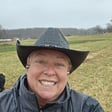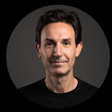Become a Creator today!Start creating today - Share your story with the world!
Start for free
00:00:00
00:00:01

Conversations with Sales Exec Nick Kuoma
Join us as Nick shares his health wake up call and how he redefined what wellness meant to him for long term gain.
Transcript
Introduction and Guest Background
00:00:00
Speaker
That was my friend's one piece of advice to me before starting a podcast was don't forget to hit record.
00:00:12
Speaker
All right.
00:00:12
Speaker
So I want to welcome everybody to Something's Brewing, where we fill your cup with inspiring conversations.
00:00:18
Speaker
I can't tell you the amount of times I've had conversations with the people, and I wish I had recorded them for others to listen to.
00:00:25
Speaker
So here we are, and I'm with Nick today.
00:00:28
Speaker
So Nick, thank you for being a guest on the show today.
00:00:30
Speaker
And I'd love for you to just take a moment to introduce yourself before we kick it off.
00:00:34
Speaker
Thanks, Laura.
00:00:35
Speaker
I'm excited to join you and chat with you.
00:00:39
Speaker
Greetings from Lincoln, Nebraska.
00:00:40
Speaker
It's a land of cows and corn.
00:00:43
Speaker
I am sure that, Laura, you've definitely been here.
00:00:46
Speaker
I can vouch for that, yes.
00:00:47
Speaker
You can vouch for that.
00:00:50
Speaker
Lots of cows and corn.
00:00:52
Speaker
Originally from Lincoln, I've lived in five different countries, Germany, Sweden, the UK, the US, of course, and India, and always worked in like
00:01:03
Speaker
the HR space on the sales team, so HR tech sales over the last nearly 20 years of my career.
Understanding and Practicing Wellbeing
00:01:10
Speaker
It's good to chat with you today.
00:01:12
Speaker
It's so good to chat with you.
00:01:13
Speaker
And for everybody who's listening, Nick and I formally worked together and built a nice relationship.
00:01:18
Speaker
Actually, when I went to Lincoln, I was able to spend 24 hours with Nick and get a little bit of a tour of whatever exists out there.
00:01:29
Speaker
Went from what, Omaha to Lincoln, or was it the other way around?
00:01:34
Speaker
We drove from Omaha to Lincoln.
00:01:36
Speaker
You're right.
00:01:36
Speaker
You nailed it.
00:01:37
Speaker
Yeah.
00:01:37
Speaker
Yeah.
00:01:38
Speaker
It was, I remember just putting my phone out the window and just like cornfields the entire time.
00:01:44
Speaker
So true.
00:01:45
Speaker
Oh my gosh.
00:01:47
Speaker
Well, I'm glad you love it out there and I'm sure there's more to do than corn and fields.
00:01:52
Speaker
So thank you for the intro.
00:01:55
Speaker
I really just want to start with, you know, what wellbeing, wellness, mental health, self-care, whatever anybody calls it these days, what does that mean to you?
00:02:05
Speaker
For me, it means a few different things.
00:02:07
Speaker
Like the meaning of it has changed over time.
00:02:11
Speaker
So I'd say at first it meant hard work because it didn't come naturally to me.
00:02:15
Speaker
And I think when people hear self-care, well-being, if you aren't deep into any specific practice, the imagery is usually like I'm getting a massage or something which is very, very passive and is like delivered to you.
00:02:31
Speaker
But for me, that's absolutely not what it is.
00:02:34
Speaker
It used to be that some years ago.
00:02:36
Speaker
But for me, the first word that comes to mind is hard work because you're trying to create intentionality around taking care of yourself.
00:02:45
Speaker
And that actually doesn't come natural to most people, I would say, based on the conversations I've had with many folks.
00:02:52
Speaker
So the first thing is hard work.
00:02:54
Speaker
The next word for me is essential.
00:02:57
Speaker
I do not show up
00:03:00
Speaker
authentically and wholly if I'm not taking care of myself.
00:03:03
Speaker
And so, you know, hard work and essential are vital to like total well-being.
00:03:09
Speaker
These are the words that sort of come to mind for me.
00:03:12
Speaker
The practices that I exercise, they vary from
00:03:15
Speaker
from yoga when we think about breath work and connecting with mind and body, but then also definitely the massages, big fan of massages.
00:03:24
Speaker
So good.
00:03:26
Speaker
Yeah.
00:03:26
Speaker
So good.
00:03:27
Speaker
So necessary.
00:03:29
Speaker
So it varies from one thing to the next.
00:03:31
Speaker
And yeah, it's the last thing I would say is it's, it's usually quite deeply personal.
00:03:36
Speaker
It needs to be something that you feel connected to that, that brings you joy, but also allows for reflection and growth.
00:03:44
Speaker
I love that.
00:03:45
Speaker
I love that for many reasons.
00:03:47
Speaker
One hard work for me, I think just hit a new definition lately where, you know, I've been in therapy for years, but I've, I've taken the logical side where I'm like, oh yeah, this leads.
00:03:57
Speaker
So this leads to this.
00:03:59
Speaker
And I never had the intentionality piece of
00:04:03
Speaker
actually purposely making the changes.
00:04:06
Speaker
And when they say change is hard, change is definitely hard, you know, for to rewire your brain.
00:04:11
Speaker
Like I'm somebody who like, I love to work out.
00:04:13
Speaker
That's a change I can definitely do.
00:04:15
Speaker
But when it comes to like habits in the mind that require change, that's a completely different thing for me.
00:04:22
Speaker
Yeah, that's right.
00:04:23
Speaker
It starts with mindsets there.
00:04:25
Speaker
When you think about embracing change,
00:04:29
Speaker
If it's something that somebody's telling you, you have to do, usually it doesn't take hold, then it's sort of a vanity change, which doesn't actually stick.
00:04:38
Speaker
But when you start to internalize it and say, hey, this is something I want to do.
00:04:43
Speaker
And I stress the word want, not need.
00:04:46
Speaker
This is something I want to do.
00:04:47
Speaker
This is for me.
00:04:50
Speaker
Then it starts to become a little bit easier to at least get started.
00:04:55
Speaker
If not, they actually keep it.
00:04:56
Speaker
Yeah.
00:04:57
Speaker
Absolutely.
00:04:57
Speaker
And then the other side of just being uniquely personal to you, right?
00:05:01
Speaker
And that, that combined with the want, I think is so key because people, I think often wellbeing gets misinterpreted as you can take it like the meditation or massage side that you said of just like this fancy kind of wellness, right?
00:05:17
Speaker
Or
00:05:18
Speaker
the opposite where people are like, oh, I need to diet and that's restriction.
00:05:23
Speaker
And that's, I need to lose weight for whatever reason they have, but it's not something that they want to do.
Personal Health Scare and Lifestyle Changes
00:05:29
Speaker
And then they feel like they're sacrificing, right.
00:05:31
Speaker
Versus doing something that they want to do that fills their soul and then might actually result in adding other wellbeing things and wellness things to their life that continuously and compliments each other and adds on to each other.
00:05:46
Speaker
You know, you're touching on something which is crucial.
00:05:49
Speaker
You're sort of comparing and contrasting restriction versus filling.
00:05:54
Speaker
And I think that that's a big part of it.
00:05:56
Speaker
And that is a part of the mindset.
00:05:57
Speaker
Like, am I looking at this as something which is going to limit my life?
00:06:01
Speaker
Or am I looking at this as something which is going to fulfill the life I want to live?
00:06:06
Speaker
And so it's a
00:06:07
Speaker
it's an important compare and contrast and, and, and it's a journey for everybody.
00:06:11
Speaker
It's an ongoing one.
00:06:13
Speaker
Even, even when I know it, even when I know, Hey, like probably shouldn't have that slice of cake.
00:06:19
Speaker
Like I'll still have that slice of cake.
00:06:21
Speaker
Just to think about like physical wellbeing because it, it, it brings something to my life as well.
00:06:27
Speaker
And so, you know, and not beating yourself up over it, you know,
00:06:31
Speaker
Yeah, yeah, exactly.
00:06:33
Speaker
Exactly right.
00:06:34
Speaker
I mean, if we're forcing ourselves into one way and we see I need to, then ultimately we've already created resistance, right?
00:06:41
Speaker
We've already created friction for ourselves to get to where we want to be or where we say we want to be.
00:06:46
Speaker
But there's other avenues to approach the idea of wellness and starting somewhere small that really resonates with you as a unique individual and fulfills something within you.
00:06:57
Speaker
And that's where every blueprint for everybody is different.
00:07:00
Speaker
And so there's not a one size fits all.
00:07:02
Speaker
And I, you know, I love that meaning for you.
00:07:06
Speaker
And I know that you've had your own experience with a health wake up call that led to kind of your own deeper personal journey.
00:07:12
Speaker
So can you share a little bit about that?
00:07:14
Speaker
Yeah.
00:07:15
Speaker
So it was November of 2019.
00:07:18
Speaker
My wife drove me to the emergency room and the ER doc told me that I have bilateral pulmonary emboli.
00:07:27
Speaker
which if you don't know what those words mean, I'm so happy for you.
00:07:31
Speaker
It's blood clots in either lung.
00:07:35
Speaker
And, you know, when you're sort of in your 30s, you still tend to feel rather invincible.
00:07:40
Speaker
At least I did, most certainly.
00:07:42
Speaker
And so I heard those words, but it actually took him a little bit of massaging for me to really truly understand, like, hey, this is very serious.
00:07:51
Speaker
He said one in three people don't make it.
00:07:53
Speaker
where you are right now, like this is a life threatening situation that you're in.
00:07:58
Speaker
I was in the hospital for a week.
00:08:00
Speaker
Honestly, the, like the physical recovery side was almost easy.
00:08:07
Speaker
It was like clockwork.
00:08:08
Speaker
Once I got started, I just really didn't quit.
00:08:11
Speaker
The doctor gave me some things I needed to do, which were very obvious from, uh, I needed to, needed to lose weight.
00:08:17
Speaker
I'm dangerously obese.
00:08:20
Speaker
Um,
00:08:20
Speaker
And, uh, you know, weighing close to 300 pounds with my six foot frame, it's just simply not something that that's sustainable.
00:08:26
Speaker
Uh, I, I needed to eat healthier, um,
00:08:30
Speaker
And at that moment, it was definitely needed to be more aware of my posture whenever I was traveling or sitting and working at my desk and generally just reframe what I saw as healthy exercise for a person of my age and stature.
00:08:45
Speaker
And so I worked on those things and over the course of seven, eight months, dropped down to nearly 210 pounds.
00:08:52
Speaker
And but I
00:08:54
Speaker
but I did it in a way which wasn't sustainable.
00:08:57
Speaker
I ran myself pretty much to vapors.
00:08:58
Speaker
I was barely eating and the mental and physical ramifications of that were pretty strong.
00:09:05
Speaker
And so like after that, my journey of like mental health truly started.
00:09:11
Speaker
I started to over time realize, hey, like I just faced death.
00:09:17
Speaker
And so there's all sorts of thoughts that sort of creep into your mind.
00:09:22
Speaker
um and finding finding a way over time to address that has always it will continue to be but it most certainly was a struggle at first I'll just very candidly say it I didn't expect that something like that would be happening to me especially at that point in time absolutely and uh so yeah it um it was it was intense it was really intense I was fortunate to have
00:09:50
Speaker
an extremely supportive wife, but Sonia, who was, who was there to be my coach also there to just kick me in the butt when I needed to be and daughter bringing sort of the play and joy to my life during the very challenging time and family and friends and colleagues showed up for me too.
00:10:07
Speaker
But like those two ladies of mine, they definitely were the ones who got me through the whole thing and continue to help bring joy to my life every day now.
00:10:17
Speaker
Yeah.
00:10:18
Speaker
Yeah.
00:10:21
Speaker
Thank you for sharing and definitely a scary, scary instance to go through for sure.
00:10:27
Speaker
How would you say it kind of shaped your longer term vision on wellbeing or even historically what you weren't doing for yourself and how you changed that to better take care of yourself?
00:10:40
Speaker
Yeah, it's so, so it definitely helps me understand what self-care actually looks like.
00:10:48
Speaker
Um,
00:10:49
Speaker
Because I think I had it entirely framed incorrectly before.
00:10:54
Speaker
And so self-care starts with self-love.
00:10:58
Speaker
And self-love looks and shapes up in many different ways.
00:11:03
Speaker
And the way I treat my physical body as well as my mind is super important.
00:11:08
Speaker
I'm hard on myself.
00:11:09
Speaker
I have high expectations of myself.
00:11:11
Speaker
And so whenever I set my mind to do something, I tend to do it at all costs.
00:11:16
Speaker
All or nothing.
00:11:16
Speaker
Hence, you work in sales.
00:11:19
Speaker
Depends I work in sales.
00:11:21
Speaker
Oh my gosh.
00:11:22
Speaker
But that all or nothing mentality leads to burnout, leads to lots of missed expectations, can lead to anxiety.
00:11:32
Speaker
And so that's the first thing is reframing what self-care looks like and really actually understanding what loving myself means.
00:11:41
Speaker
And making sure that I surround myself with people who are supportive as well.
00:11:47
Speaker
From a work perspective, from a friend's perspective, family as well.
00:11:53
Speaker
And so that was definitely a big part of it, a big takeaway from there.
00:11:59
Speaker
The other thing I would say is, and this was a big one, exercise doesn't need to be painful.
Self-Awareness and Reflection Practices
00:12:08
Speaker
Reach that, yes.
00:12:10
Speaker
Yeah, exercise can be gentle and still have impact.
00:12:14
Speaker
Like when people talk about 10,000 steps a day, I mean, honestly, it's true.
00:12:20
Speaker
You don't need to be in pain physically.
00:12:23
Speaker
to accomplish a physically healthy life.
00:12:27
Speaker
And I think it's become so normalized in the society we live in.
00:12:31
Speaker
Like if you're not covered in sweat and sore in a couple of hours, you're doing it wrong.
00:12:36
Speaker
And I just, that was how I used to be.
00:12:39
Speaker
And I've been on my own journey of changing that as well.
00:12:42
Speaker
Yeah.
00:12:43
Speaker
It's so hard.
00:12:44
Speaker
I mean, movement, I think is the key word versus exercise, right?
00:12:48
Speaker
And just moving, no matter what that looks like, has the benefits, physical benefits, psychological benefits that have been proven, you know?
00:12:56
Speaker
So one of the things that comes up for me is...
00:13:02
Speaker
there are a lot of people that don't look inward, right?
00:13:06
Speaker
We take care of other people first.
00:13:08
Speaker
And so one of the things that I've, and I've noticed it about myself where I've either looked for external validation or, you know, I'm taking care of others thinking that it fulfills myself.
00:13:17
Speaker
And then certain things happen.
00:13:19
Speaker
You know, you had your health scare.
00:13:21
Speaker
I had, you know, most recently two different infections due to stress.
00:13:25
Speaker
And I think that that has redefined you, you know, self-care and stress in my mind.
00:13:31
Speaker
And so how would you say that, you know, what is the encouragement for people to pause, right?
00:13:39
Speaker
Feeling that they deserve to know what self-care looks like for them, because it only means that they're going to be able to care for other people better.
00:13:48
Speaker
Yeah, that's a good point.
00:13:49
Speaker
Looking inward instead of looking outward.
00:13:52
Speaker
And for me, if a person's starting like an inner work journey for the very first time,
00:13:58
Speaker
journaling is is a big recommendation i've used it as a tool for points in time i'm not a daily writer writer in a journal i do write daily like on linkedin i i do i i do i have different forms of expression in a written manner which goes beyond writing emails for work um but uh but journaling honestly journaling and and if you treat your journal as this sort of
00:14:25
Speaker
safe guarded location where nobody will see it up then it allows you to actually explore how you're truly feeling about things um journaling every day is not for me but journaling is a fantastic tool for points in time um some folks some folks have multiple journals they write in every day based on like the the topic they're wanting to cover with themselves and i think that's amazing um and it's good you do you
00:14:50
Speaker
And so that's the thing I would say is like reflection in order to kickstart that inner work journey.
00:14:57
Speaker
And the most important question that I would recommend reflecting on is why?
00:15:02
Speaker
Why are you doing this?
00:15:04
Speaker
What is the impetus for change?
00:15:06
Speaker
Why are you sitting down and wanting to work on yourself?
00:15:10
Speaker
And really getting to the crux of that will allow you to start to develop practices that make sense for you.
Managing Stress in Professional Environments
00:15:16
Speaker
You might find out that what you thought you wanted to do for self-care or exercise or whatever it may be, isn't actually aligned with your why.
00:15:24
Speaker
And so aligning with your why through deep reflection, especially in a very private manner,
00:15:32
Speaker
Journaling is a great example because, hey, it's the cost of a notebook and a pen, I suppose.
00:15:37
Speaker
It's like, I'm sorry.
00:15:40
Speaker
Unless you have ink these days, I guess you need a pen.
00:15:45
Speaker
Yeah, yeah.
00:15:46
Speaker
Go find a feather.
00:15:48
Speaker
You can do a little ink and quilt.
00:15:50
Speaker
Like it's cost effective and all you need is time and your thoughts.
00:15:55
Speaker
And it's a good way to get started.
00:15:57
Speaker
I love that.
00:15:58
Speaker
I always come back to the why, you know, even in my like nutrition counseling days, it was always, you know, you know what to eat.
00:16:04
Speaker
Why are you here?
00:16:05
Speaker
You know, find your why, because that's what you're going to attach to.
00:16:07
Speaker
And that's where you're going to come back to every time you want to change or you're reaching a point of friction or anything like that to keep going.
00:16:15
Speaker
You have that why.
00:16:17
Speaker
And you mentioned burnout and different things like that, but I mean, you've worked in many startups, including the one we worked in together.
00:16:24
Speaker
And as we both know, they're breeding grounds for burnout and stress.
00:16:28
Speaker
And that can wreak havoc on the mind and the body, as we both have seen in different ways.
00:16:34
Speaker
Obviously, stress and burnout pertinent to any part of life, not just startups, but typically there's less people doing more.
00:16:40
Speaker
And in an earlier conversation you and I had, we mentioned burnout.
00:16:44
Speaker
You had mentioned burnout and the drive you had to form balance in your life.
00:16:48
Speaker
So I wanted to kind of dive into that a little bit of where stress has shown up for you and how you started to bridge the gap to find some balance for yourself between work and life.
00:17:00
Speaker
Yeah, it's an interesting question.
00:17:03
Speaker
When you started to frame it up, it definitely was looking at like high stress environments, right?
00:17:08
Speaker
When you think about startups, I think stress exists around every corner.
00:17:13
Speaker
And it's more about one, recognizing, hey, I'm stressed because there are a lot of folks who can't even recognize what stress looks and feels like on themselves.
00:17:22
Speaker
They might be able to see it on others.
00:17:23
Speaker
Like we talked about recognizing, helping externally other people.
00:17:28
Speaker
But internally, internally, being able to look at it and say, I feel stressed, I'm stressed, and it's not not healthy.
00:17:35
Speaker
It's okay to be nervous.
00:17:36
Speaker
It's not okay to be anxious.
00:17:38
Speaker
Right?
00:17:38
Speaker
Those are two very different words.
00:17:41
Speaker
And so the first thing is like recognizing stress.
00:17:45
Speaker
The second thing is understanding if it's something you can, if you can actually
00:17:49
Speaker
cope with, deal with.
00:17:51
Speaker
And the third thing, if you cannot, what change needs to happen.
00:17:54
Speaker
And so creating tools to be able to handle stress, which goes back to self-care, like we were talking, that's definitely a big part of it, getting in the yoga practice, getting in the meditation where you chant your daily mantra.
00:18:08
Speaker
All of these things
00:18:10
Speaker
and more are critical.
00:18:12
Speaker
Doing the breath work.
00:18:13
Speaker
I'm referencing things that, you know, have been extremely useful tools for me.
00:18:18
Speaker
Tools that are point in time to help sort of recenter and realign myself.
00:18:21
Speaker
I don't do them all every day.
00:18:23
Speaker
I do them when I think that they're most useful in the moment or in like chapters of time.
00:18:29
Speaker
And so that's what I would say.
00:18:30
Speaker
Recognize that you are stressed.
00:18:33
Speaker
Identify how you can cope with that stress.
00:18:35
Speaker
And if the coping isn't working, is it something that
00:18:38
Speaker
you can change, whether it's your environment or, you know, taking a break from something, whatever it may be.
00:18:45
Speaker
You brought up work environments.
00:18:47
Speaker
I mean, startups notoriously are like high stress, all hands on deck.
00:18:53
Speaker
Everyone pick up an aura and row.
00:18:55
Speaker
Yeah.
00:18:56
Speaker
building the plane as we're falling off the cliff imagery.
00:19:04
Speaker
And so it's like, hey, that is the startup world.
00:19:07
Speaker
And if you don't have a solid mental health practice, then the likelihood of you burning out in startups is extremely high.
00:19:16
Speaker
I've been a part of three startups, a fourth company that was sort of like perpetually in startup mode, even though it was a publicly traded company.
00:19:24
Speaker
I've also worked at IBM and then I work at another, you know, large organization now today, Qualtrics with 6,000 folks.
00:19:31
Speaker
And it's like,
00:19:32
Speaker
Each of them had different stress factors.
00:19:35
Speaker
Each of them had people who were extremely helpful for me in my journey, as well as people who were unfortunately the antagonist in the story.
00:19:43
Speaker
And it all just goes back to those three steps.
00:19:47
Speaker
Are you stressed?
00:19:47
Speaker
What can you do with it?
00:19:49
Speaker
And if you can't handle it with yourself, what change can you make with your environment?
00:19:55
Speaker
The word that comes to mind as you're speaking is just self-awareness.
00:19:58
Speaker
And I think that that's something, right?
00:20:01
Speaker
Like that's the biggest thing here that we're talking about.
00:20:04
Speaker
It's just sitting, almost sitting with yourself, right?
00:20:06
Speaker
And being honest with yourself, which are two very hard things to do, but without the self-awareness, we're on autopilot.
00:20:12
Speaker
You know, we don't even realize certain things.
00:20:14
Speaker
And I think that that's where some of the danger is.
00:20:18
Speaker
you know, if I can use that word comes in where you're most like your worst enemy at that point, you know?
00:20:24
Speaker
So there's a lot of people that don't feel they have the time to do it or don't have the self-awareness to even know that they might be stressed out.
00:20:33
Speaker
Right.
00:20:33
Speaker
Or like you mentioned before, being a, you know, a sales guy who has the perfectionistic kind of background that wants to drive and continue driving.
00:20:42
Speaker
It's hard to pause.
00:20:44
Speaker
You know, it's hard to take that step back and we're not used to slowing down.
00:20:48
Speaker
We're used to, you know, being faster and faster.
00:20:50
Speaker
And we think that that's a sign of doing well, right?
00:20:55
Speaker
But is that doing well for ourselves?
00:20:57
Speaker
Yeah, I love what you're touching on.
00:20:59
Speaker
So it makes me think of like two different things.
00:21:01
Speaker
One, I have a friend who always used to say, probably still says, he just hasn't said it in recent times to me, but things have never been this fast as they are now and things will never be as slow as they are today.
00:21:14
Speaker
Meaning we're going, the world is continuing to accelerate.
00:21:17
Speaker
And so like allowing ourselves to break away from that speed and actually hit the pause button does take self-awareness.
00:21:25
Speaker
And that leads to the second thing, self-awareness, good news.
00:21:29
Speaker
It's a boostable behavior.
00:21:30
Speaker
It's something you can actually improve on.
00:21:32
Speaker
It's not stuck and locked in the position that you're at.
00:21:35
Speaker
And you just like simply have to be at that level of self-awareness.
Humanizing Professional Experiences
00:21:40
Speaker
You can become more self-aware with intentional effort and time.
00:21:44
Speaker
Again, that takes hard work.
00:21:46
Speaker
Self-awareness is a part of self-care, a part of mental health.
00:21:49
Speaker
And so like back to the very first thing we said, it's hard work, but it's worth it.
00:21:56
Speaker
And you have to want it.
00:21:57
Speaker
You know, you have to identify that there's like a change that can exist, right?
00:22:01
Speaker
And say, this is how I'm feeling now, but how do I want to feel?
00:22:04
Speaker
And there's that, you know, that space in between of how you're going to fill that, you know, how you're going to get from A to B.
00:22:11
Speaker
Yeah, 100%.
00:22:12
Speaker
Oh my gosh.
00:22:13
Speaker
Love that.
00:22:15
Speaker
You also mentioned your presence on LinkedIn.
00:22:17
Speaker
So I'm somebody who journals every day.
00:22:19
Speaker
And obviously that's something that you do as needed.
00:22:22
Speaker
And that's part of the unique self-care routine that we develop for ourselves.
00:22:27
Speaker
You also use LinkedIn as a platform for yourself to share a lot about your personal journey as well as motivating others.
00:22:34
Speaker
So what inspires you with that?
00:22:36
Speaker
And what are you looking to inspire in others?
00:22:39
Speaker
What has LinkedIn done for you?
00:22:41
Speaker
Hey, thanks for bringing that up.
00:22:44
Speaker
I, you know, for me, it all anchors back to why I even use the platform.
00:22:48
Speaker
And it actually allows me to show up in a way that brings joy for me and hopefully to others.
00:22:56
Speaker
And my why for actually sharing on LinkedIn and engaging with other folks' content, especially the content that I get excited about is to reflect, to connect, and to humanize experiences.
00:23:07
Speaker
So actually reflecting on my own journey and
00:23:10
Speaker
sharing that outwardly to help normalize some of the positive and negative experiences that people face daily to connect.
00:23:19
Speaker
I like to literally just connect individuals to each other, whether they're trying to look for a job, they're trying to
00:23:26
Speaker
you know, grow and develop a podcast for the first time, whatever it may be, it brings me joy to bring like minded people together.
00:23:32
Speaker
And I don't need to get anything from it other than like this, you know, borderline altruistic happiness.
00:23:39
Speaker
And, and then the last thing is to humanize experiences like we're people we're all living, breathing,
00:23:48
Speaker
individuals, even if we're trying to put our best foot forward and present like this, this beautiful portrait of the life we lead, everyone actually has, you know, bad days.
00:23:58
Speaker
And so it's like, let's just bring a touch of humanity back to the conversation.
00:24:04
Speaker
And so that's, that's sort of the why.
00:24:07
Speaker
And it allows me to stay centered with the content I share with the voice I bring, how I show up,
00:24:15
Speaker
And then the people I follow, the ones who sort of, you know, I guess, give me inspiration on a daily basis.
00:24:26
Speaker
And I have all sorts of folks that I get excited to check my newsfeed for and see what it is they drop for the day.
00:24:34
Speaker
It's just, it's a good thing.
00:24:36
Speaker
It's a good thing from my point of view.
00:24:38
Speaker
Well, the idea of humanity is so necessary on a platform that's specifically geared towards professional life.
00:24:46
Speaker
And I think one of the last things that I was really eager to talk to you about is like this dichotomy that exists between, you know, employee well-being and personal well-being and how we've become so separate in identifying the two as two separate things.
00:25:00
Speaker
When in reality, everybody's encouraged to bring themselves to work.
00:25:04
Speaker
Right.
00:25:05
Speaker
So we identify with how do we enhance employee well-being?
00:25:08
Speaker
But it's kind of the same thing.
00:25:10
Speaker
You know, I don't know if you agree with that or or not, but by having them separate buckets, I think is creating an issue in our society as well.
00:25:20
Speaker
You know, it's interesting.
00:25:20
Speaker
It varies from person to person and from company culture to culture.
00:25:25
Speaker
Like right now, the manager I have, she's fantastic about supporting me with everything that I'm doing when it comes to how I work, how I show up at work, but also like my personal life as well.
00:25:36
Speaker
If I have something that comes up, I have a daughter who's seven and seven-year-olds are needy.
00:25:41
Speaker
Like, let's be really honest.
00:25:43
Speaker
They have lots of needs.
00:25:44
Speaker
They should.
00:25:45
Speaker
They're only seven.
00:25:45
Speaker
They can't take care of themselves.
00:25:46
Speaker
Hey, 32-year-olds are needy too.
00:25:48
Speaker
I think everyone's needy.
00:25:49
Speaker
This is true.
00:25:51
Speaker
At least if they're not saying it, then that means they're not expressing the needs.
00:25:56
Speaker
And so like being able to just, you know, shoot a text and say, hey, you know, I know we're supposed to meet, but I got to go do this for my daughter.
00:26:03
Speaker
And just being like shamelessly supported makes a huge difference.
00:26:07
Speaker
I've had work experiences where that wasn't the case.
00:26:10
Speaker
I've had work experiences where it was toxic positivity.
00:26:14
Speaker
But then on the other end, I've also had work experiences where people
00:26:18
Speaker
whether they're a manager, a colleague, whatever it may be, whomever it may be, they show up for you.
00:26:22
Speaker
When I was admitted to the hospital, one of the first people to come and visit me was my boss, who's the managing director of this 50-person services startup.
00:26:33
Speaker
He came into the hospital, he sat down with me, and he just sat with me.
00:26:37
Speaker
And I'll never forget that.
00:26:39
Speaker
I'm beyond grateful for people showing up in such ways.
00:26:43
Speaker
And so I think everyone's had varied work experiences.
00:26:47
Speaker
And that's why we hear so often people don't leave companies, they leave managers.
00:26:53
Speaker
And so when we sort of put it in this bucket of personal versus professional or at work well-being, for me, all of it comes down to the community you operate in or the ecosystem you're in or the company team culture that you're operating in.
Mental Health in the Workplace
00:27:09
Speaker
And if it doesn't fit you, if it doesn't support you, easier said than done.
00:27:14
Speaker
go find one that does.
00:27:15
Speaker
That's, that's the only, like, that's the only thing I can think of.
00:27:18
Speaker
It sort of goes back to those three steps of stress.
00:27:20
Speaker
Like, am I stressed?
00:27:22
Speaker
What can I do with it?
00:27:23
Speaker
If I can't handle it by sort of working on myself internally, what can I change externally?
00:27:29
Speaker
And so that's,
00:27:30
Speaker
That's the thought that comes to mind for me.
00:27:32
Speaker
It just, it varies from person to person.
00:27:35
Speaker
And I don't know.
00:27:36
Speaker
Yeah.
00:27:36
Speaker
The other thing I'll add is there still is like remnants of stigma around like mental health at work.
00:27:45
Speaker
And so yeah,
00:27:46
Speaker
And as a result, we see things like EAP systems are underutilized so that the benefits that a company provides often therapy is an underutilized thing, even though it's fully paid for and free and people can use it, you know, usually six, 10 sessions, whatever it is, find a therapist, talk about something that's bothering you.
00:28:04
Speaker
Most people look at it and go, well, that's actually me giving up.
00:28:07
Speaker
And that's just, that's simply not true.
00:28:09
Speaker
It's actually you being at your strongest point.
00:28:11
Speaker
Absolutely.
00:28:13
Speaker
The stigma is there, but it,
00:28:15
Speaker
I don't think you can do broad brushstrokes.
00:28:17
Speaker
I think it varies from like individual to individual.
00:28:21
Speaker
Yeah.
00:28:21
Speaker
And I'll pull in our other theme of self-awareness, right?
00:28:24
Speaker
If you need something and you know, you need something being able to advocate for yourself,
00:28:29
Speaker
in your workspace is going to be another key aspect for you, you know, and knowing whether you have a supportive manager or not is going to be paramount to a decision that you make, you know, if that's something that really means something to you.
00:28:42
Speaker
I agree.
00:28:43
Speaker
I agree.
00:28:44
Speaker
Knowing that you can actually be vulnerable with boundaries and
00:28:49
Speaker
give a shout out to Brene Brown, who is amazing.
00:28:53
Speaker
If you feel like you can be vulnerable appropriately at work, then you're in a good spot.
00:28:58
Speaker
Honestly, like it shouldn't be seen your manager or your colleague relationships shouldn't be seen as like this parking lot for negativity or problems.
00:29:09
Speaker
But to be able to say, hey, I have this going on.
00:29:12
Speaker
I'd like to talk about it for a couple minutes or like I need your help.
00:29:16
Speaker
That's that's great.
00:29:17
Speaker
That's a good situation.
00:29:19
Speaker
Yeah.
00:29:20
Speaker
If anything, you learn about, you know, who you're working with, you know, and you can make a stronger decision for yourself and advocate for yourself even more from there.
00:29:27
Speaker
But give somebody the opportunity to be there for you, I would say.
Conclusion and Invitation to Connect
00:29:31
Speaker
Well, as we do, you know, wrap up, I feel like I could talk about this with you forever.
00:29:37
Speaker
There's so many avenues to take this, but I guess I always like to end with like, what advice would you have for others?
00:29:45
Speaker
If you could give people one thing to do today to enhance their own feeling of self-care, what would that be?
00:29:52
Speaker
I'd say the advice is stop and reflect.
00:29:55
Speaker
It's hard for me to think about it because so many people will be at different points in their journey.
00:29:59
Speaker
So some will be just getting started.
00:30:01
Speaker
Others will be well down the track.
00:30:03
Speaker
And I think it's always advisable, even if it doesn't feel natural to stop what you're doing and reflect and make sure you're on the right path or getting started on the right path.
00:30:15
Speaker
Um,
00:30:15
Speaker
So that self-reflection, the concept of journaling or speaking with a therapist or finding that friend who actually is a solid sounding board, who isn't just going to echo back to you what it is they think you want to hear.
00:30:27
Speaker
So stop and reflect is what I would say.
00:30:30
Speaker
And then the point of reflection is always going to come back to the why.
00:30:34
Speaker
Am I working toward my why?
00:30:36
Speaker
And if I'm not, then I'm probably headed in the wrong direction.
00:30:40
Speaker
Love it.
00:30:41
Speaker
Thank you.
00:30:41
Speaker
Anything else that you want to add or where people can find you to find some inspiration?
00:30:46
Speaker
You can find me on this podcast.
00:30:48
Speaker
That's right.
00:30:48
Speaker
I love it.
00:30:49
Speaker
I love it.
00:30:50
Speaker
Oh my gosh.
00:30:51
Speaker
Yeah.
00:30:51
Speaker
Connect with me on LinkedIn.
00:30:52
Speaker
I'd love to be connected.
00:30:54
Speaker
No need to take time sending a personalized note, but let me know if you've got some posts you've got out there that you want me to engage with or shoot me a note.
00:31:03
Speaker
I'd be happy to chat it up.
00:31:05
Speaker
So yeah, I'm on LinkedIn.
00:31:06
Speaker
You can definitely find me there.
00:31:08
Speaker
Love it.
00:31:08
Speaker
Thank you, Nick.
00:31:09
Speaker
It's been great chatting with you and I'm sure we'll have you back on the podcast and speak with you a little bit more in depth with some of these topics.
00:31:17
Speaker
So thank you again.
00:31:20
Speaker
And let us know in the comments what resonated with you and if there's any questions that you have for Nick as well.
00:31:25
Speaker
Thank you all for listening.








